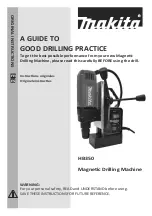
5
ENGLISH
•
Do not expose the charger to water.
•
Do not open the charger.
•
Do not probe the charger.
LABELS ON THE CHARGER
The following symbols are found on your charger:
Your charging base is double insulated; therefore no
earth wire is required. Always check that the power supply
corresponds to the voltage on the rating plate.
The charging base is intended for indoor use only.
SPECIFIC SAFETY RULES
•
Hold tool by insulated gripping surfaces when
performing an operation where the tool may
contact hidden wiring .
Contact with a “live” wire will
also make exposed metal parts of the tool “live” and
shock the operator.
•
When working on a ladder or on scaffolding be sure
to lay the tool down on its side when not in use.
Some tools with large battery packs will stand upright
but may be easily knocked over.
•
Avoid touching the tip of a drill bit just after drilling, as
it may be hot.
•
When fitting and changing accessories, always use the
instructions supplied with the accessory.
•
Should your tool develop a fault, do not try to fix it
yourself, but take it to one of our authorized repair agents.
•
DO NOT STORE BATTERY IN CHARGER WHEN NOT
CHARGING.
SYMBOLS
The label on your tool may include the following symbols:
V
volts
A
Amperes
Hz
Hertz
W
Watts
min
Minutes
Alternating current
Direct current
no
No load speed
Class II Construction
Earthing terminal
Safety alert symbol
…/min
Revolutions or reciprocations per minute
…/bpm
Beats per minute
FEATURES -FIG. A
1. Trigger Switch
2. Forward/Reverse Button
3. Quick Connect Chunk
4. Torque Adjust Collar
5. Keyless Chuck
6. Bit Holder
7. Battery
8. Battery Release Button
BATTERY CAP INFORMATION- FIG. B
Battery storage and carrying caps are provided for use
whenever the batery in charger or tool.
WARNING:
Do not store or carrying battery so that
metal objects can contact exposed battery terminals. For
example, do not place battery in aprons, pockets, tool
boxes, product kit boxes, drawers, ect. with loose nails,
screws, keys, etc. Without battery cap. Without cap in
place, battery could short circuit causing fire or burns or
damage to battery.
SAFETY WARNINGS AND INSTRUC-
TIONS: CHARGING THE DRILL
1. This manual contains important safety and operating
instructions.
2. Before using battery charger, read all instructions and
cautionary markings on (1) batterycharger, (2) battery,
and (3) product using battery.
3.
CAUTION:
To reduce the risk of injury, charge
only Black&Decker Power Packs.Other types of
batteries may burst causing personal injury and
damage.
4. Do not expose charger to rain or snow.
5. Use of an attachment not recommended or sold by
Black & Decker may result in a risk offire, electric
shock, or injury to persons.
6. To reduce risk of damage to electric plug and cord, pull
by plug rather than cord when dis-connecting charger.
7. Make sure cord is located so that it will not be stepped on,
tripped over, or otherwise sub-jected to damage or stress.
8. An extension cord should not be used unless absolutely
necessary. Use of improperextension cord could result
in a risk of fire, electric shock or electrocution.
•
Two-wire cords can be used with 2-wire or 3-wire
extension cords. Only round jacketedextension cords
should be used, and we recommend that they be listed
by UnderwritersLaboratories (U.L.). If the extension is to
be used outside, the cord must be suitable foroutdoor
use. Any cord marked for outdoor use can also be used
for indoor work. The let-ters "W" or "WA" on the cord
jacket indicate that the cord is suitable for outdoor use.
•
An extension cord must have adequate wire size (AWG
or American Wire Gauge) forsafety, and to prevent loss
of power and overheating. The smaller the gauge
number ofthe wire, the greater the capacity of the
cable; that is, 16 gauge has more capacity than18
gauge. When using more than one extension to make
up the total length, be sure eachextension contains at
least the minimum wire size.


























